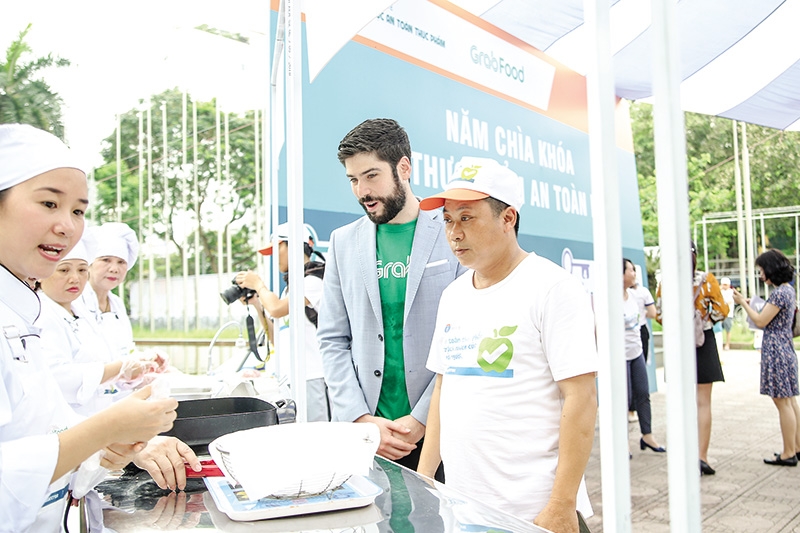Tech firms raise the bar in food safety awareness
 |
| Tech firms accompany authorities to improve food safety awareness |
The constant efforts of relevant management agencies have yielded marked improvements in enhancing the general awareness of local people about food safety. The results, however, still fell below expectations as it proves hard to approach private trading households.
Several tens of thousands of private food shops and restaurants employ hundreds of thousands of labourers and garner a significant portion of the robust local food business. However, the unstable and spontaneous nature of their business has dampened the efficiency of food safety propagation activities of state agencies.
Chasing after profit, the owners of many food shops have forgotten about the origin as well as quality of the ingredients. In addition, they fail to follow any specific food safety standards during food preservation and processing. In a recent online seminar about food safety, Tran Ngoc Tu, head of the Hanoi Food Safety and Hygiene Administration, acknowledged the difficulties in approaching private households. “We have been facing numerous hardships in giving instructions or inspecting compliance with food safety regulations at private households due to the frequent absence of shop owners,” Tu said.
Perceptions about food safety cannot be changed overnight. Many private trading households admitted that food safety is not yet part of their daily concerns, albeit they occasionally receive documents with food safety instructions from authorised agencies.
“I prepare food for customers the way I cook for my family and I thought that was enough. However, while reading through food safety instructions I realised that I have been remiss. Without frequent reminding, I might forget certain food safety principles,” said the owner of a noodle shop in Hanoi’s Ba Dinh district.
Meanwhile the owner of a hu tieu (noodle with seasoned and sautéd beef) shop in Ho Chi Minh City shared that the documents guiding food safety are rigid and difficult to follow.
“Food safety instructions should not only address shop owners, but also the staff in the restaurant, who would find it easier to absorb more hands-on materials with vivid illustrations,” he suggested. “Besides, safety must become a daily habit for each trading household, and they should depart from the mentality of only taking action when an inspection is coming.”
In fact, it is difficult for relevant authorities to oversee the operation of private food shops and restaurants based on the current limited database.
As the traditional way of approach proves labour- and capital-intensive, and has yielded limited results in the propagation of the message, finding a fresh approach has become imperative in the face of the current technology boom across the country.
Businesses operating in online food delivery are seeing an unprecedented pace of development. With their daily, and even hourly, interactions with food shops and restaurants, these apps are ideal to spread the food safety message and raise awareness among food shops and restaurants.
One owner of a GrabFood partner food shop in Ho Chi Minh City shared merrily, “I received one message from GrabFood sharing tips on how to best preserve food on sunny days to prevent the food from being contaminated by bacteria. Then yesterday I received a message reminding me of hygiene while preparing food. This helps to keep food safety in my mind at all times.”
Recently Grab, Southeast Asia’s leading on-demand transportation and fintech platform, through GrabFood, began the journey to accompany the Hanoi Food Safety and Hygiene Administration’s efforts to host the World Food Safety Day for the first time in Vietnam on June 7.
Aimed at elevating general awareness of food safety, the programme first sought to present the “five keys to food safety” of the World Health Organization to thousands of local private trading households which will be followed by diverse training courses to propagate food safety knowledge to these individual traders.
Continuously expanding the network of food shops and restaurants has provided valuable opportunities for relevant state agencies and online food delivery companies to co-operate and more comprehensively address food safety issues. Besides, offline activities to support trading households could garner higher efficiency after getting active support from relevant state agencies and technology firms.
What the stars mean:
★ Poor ★ ★ Promising ★★★ Good ★★★★ Very good ★★★★★ Exceptional
 Tag:
Tag:
Related Contents
Latest News
More News
- The generics industry: unlocking new growth drivers (February 04, 2026 | 17:39)
- Vietnam ready to increase purchases of US goods (February 04, 2026 | 15:55)
- Steel industry faces challenges in 2026 (February 03, 2026 | 17:20)
- State corporations poised to drive 2026 growth (February 03, 2026 | 13:58)
- Why high-tech talent will define Vietnam’s growth (February 02, 2026 | 10:47)
- FMCG resilience amid varying storms (February 02, 2026 | 10:00)
- Customs reforms strengthen business confidence, support trade growth (February 01, 2026 | 08:20)
- Vietnam and US to launch sixth trade negotiation round (January 30, 2026 | 15:19)
- Digital publishing emerges as key growth driver in Vietnam (January 30, 2026 | 10:59)
- EVN signs key contract for Tri An hydropower expansion (January 30, 2026 | 10:57)






















 Mobile Version
Mobile Version